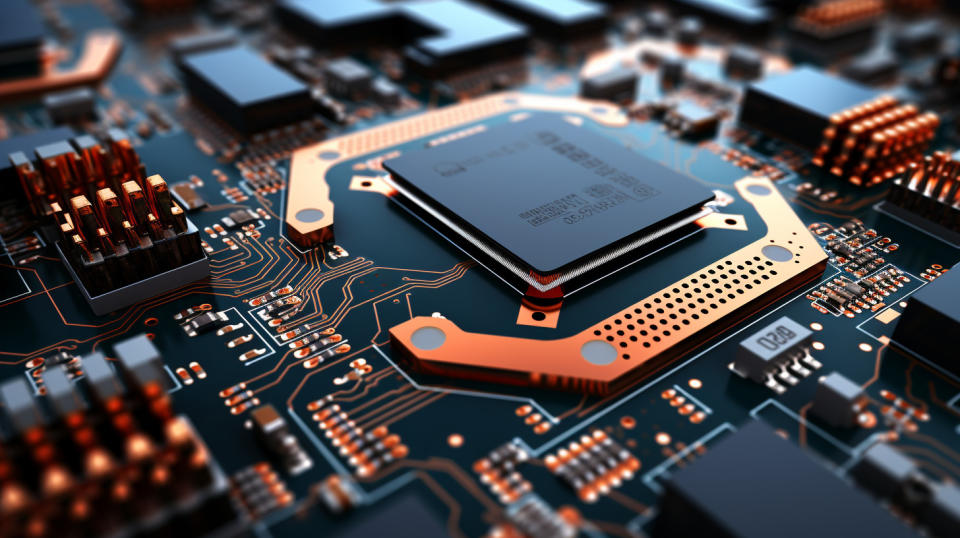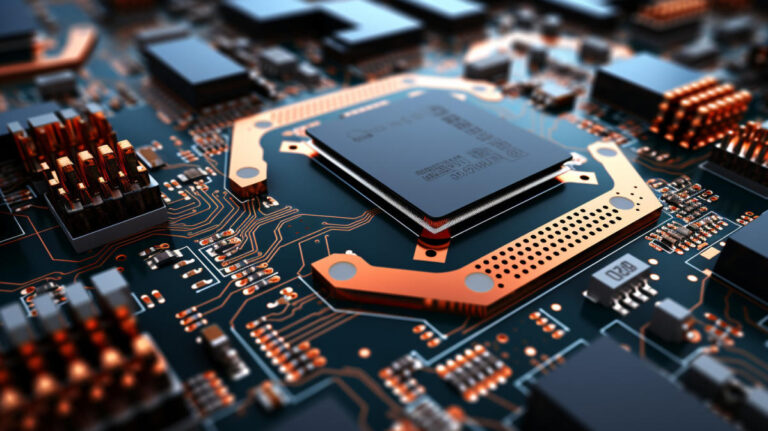We recently compiled a list of “10 Hidden AI Stocks to Buy Now,” and in this article, we’ll take a look at how Advanced Micro Devices, Inc. (NASDAQ:AMD) stands out against other hidden AI stocks.
Collaborative Partnership in AI
Artificial intelligence research and development began in academia, which dominated the field until the early 2000s. This pattern then changed, and industry took over AI with more investment, research, and cheaper inputs. Also, business investments in AI almost always lead to commercial applications, making it a more profitable activity than academia.
While these commercial relationships thrive, many companies are focusing on taking a collaborative approach to partnerships, revolutionizing the AI industry. By partnering with technology giants, these companies are accelerating AI adoption, driving vertical growth through specialized models, and increasing the demand for powerful computing resources. This strategic approach is shaping the future of AI.
This was also covered recently in another article, “7 Most Popular AI Penny Stocks Under $5,” an excerpt of which is below.
“OpenAI’s approach of fostering collaboration rather than competing directly with the tech giants makes it an exceptional model. Fred Havemeyer, lead software equity research analyst at Macquarie Bank, praised GPT 4’s “emotional intelligence.” Demand for AI chips is on the rise, as evidenced by OpenAI’s use of over 1.7 trillion parameters in its GPT 4 model, which will further fuel growth for NVIDIA and other AI chip makers.”
On August 20, Bloomberg reported that OpenAI will release a feature that allows companies to use their own data to customize GPT 4 and train it with additional information for niche tasks. This is an example of a company fine-tuning an AI model to act as a customer service chatbot for its own area of expertise. According to DeepL CEO Jarek Kutylowski, specialized AI models are essential for companies to grow vertically. “
Since its founding in 2015, the research company has been promoting open research and collaboration within the AI community. By sharing its findings and models, OpenAI encourages other researchers and organizations to build on its work, accelerating progress in AI and fostering a more inclusive environment.
Thanks to the tech giant’s investment ($1 billion in 2019), OpenAI has partnered with Microsoft to enable deep integration of OpenAI’s models into their products, and Azure will offer these models as a compliance-ready solution, important for industries that require high levels of data security.
The story continues
Following this, Brazil partnered with the tech giant to use OpenAI to reduce justice costs: by automating processes, the Brazilian judiciary is able to process cases faster, improving efficiency and reducing costs for the public sector.
In a recent discussion on CNBC, Rosenblatt Securities’ Barton Crockett and Evercore ISI’s Amit Daryanani agreed that AI is essential to Apple’s future success. Crockett emphasized that AI offers a unique opportunity to revitalize the company’s device ecosystem, and that consumers are increasingly placing an emphasis on AI capabilities in their tech devices, in which the company appears to be lagging behind. He suggested that partnering with an AI company like OpenAI could help fill this gap and strengthen its offering.
OpenAI is seeking significant new funding that could value the company at more than $100 billion, Bloomberg and The Wall Street Journal reported. The investment round, led by Thrive Capital, highlights the growing competition among tech giants for dominance in the AI industry.
In August 2024, WebProNews reported that OpenAI’s user base had doubled to more than 200 million in a year, and its annual revenue exceeded $2 billion. Currently, more than 90% of Fortune 500 companies use OpenAI products. But to maintain its lead, it must address concerns about practicality, safety, and ease of use. OpenAI’s plans, including a new search engine, SearchGPT, are aimed at addressing these challenges and solidifying its position. CEO Sam Altman believes SearchGPT can significantly improve search capabilities.
These cases raise the question of whether collaboration or competition can drive AI progress fastest. As Dylan Jones, managing partner at Boldsquare, points out, strategic partnerships can have a big impact on a company’s valuation. The moves by tech giants signal a calculated effort to maintain AI leadership, even if it means blurring the lines between collaboration and competition.
During a discussion on CNBC’s “Squawk Box,” CoreWeave co-founder and CEO Mike Intrater said that demand for AI infrastructure has been unrelenting and has been in a severe imbalance for the past two and a half years.
He believes that while demand for Nvidia chips is surging, others in the industry, including CoreWeave, are also trying to keep up. According to Intrator, CoreWeave and its customers expect a significant increase in demand for AI infrastructure. With limited capacity in the industry, customers are struggling to train and serve AI models. CoreWeave’s ability to deliver AI infrastructure at scale puts it in a good position to meet this growing demand.
However, startups often fall victim to these partnerships and lose out in the competition with tech giants. Still, many companies are emerging and growing at a good pace. In this context, we have prepared here a list of 10 hidden AI stocks to buy now.
Methodology
To compile this list, we reviewed media coverage and watched interviews with Wall Street analysts to identify hidden AI stocks that are not on the radar. We compiled a list of 20 stocks and selected the 10 most popular among elite hedge funds that we expect to benefit significantly from the long-term trend in artificial intelligence. These stocks are ranked by the number of hedge funds holding the stocks as of the second quarter of 2024.
Why are we interested in hedge fund concentrated stocks? The reason is simple: our research shows that you can outperform the market by mimicking the top stock picks of the best hedge funds. Our quarterly newsletter strategy selects 14 small and large stocks each quarter, and has returned 275% since May 2014, beating the benchmark by 150 percentage points (more details here).


A close-up of a complex-looking PCB board with several semiconductor components integrated into it.
Advanced Micro Devices (NASDAQ:AMD)
Number of hedge fund holders: 108
Advanced Micro Devices, Inc. (NASDAQ:AMD) is a leading semiconductor company that uses AI to optimize chip designs, improve manufacturing processes and develop AI-enabled hardware and software solutions. AMD’s AI-enabled technologies are driving innovation across multiple industries, including gaming, data center and scientific computing.
Microsoft recently hailed its Instinct MI300X AI accelerator as the best price-performance AI chip available. This is significant because Microsoft expects to soon sell up to 50 million AI-enabled personal computers. The Instinct MI300 series accelerators, due to launch in 2023, will include AI and HPC chips that compete with Nvidia’s H100.
CEO Lisa Su highlighted the growing interest in AI for the Instinct MI300X solution. Demand for AMD’s AI chips is growing as major cloud and enterprise providers expand their offerings. Additionally, Su noted growing demand for general-purpose computing in both the client and server processor businesses.
In Q2, Data Center revenue increased 49% year over year. Overall quarterly revenue increased 8.88% for total revenue of $5.84 billion. Ryzen CPU sales increased 49% year over year. Gaming revenue decreased 59% due to lower PlayStation and Xbox sales, but Radeon 6000 GPU sales increased year over year.
The company’s strong performance and AI investments suggest that the future of the AI market is bright. The company will benefit greatly from increased AI spending. 108 hedge funds held long positions in the company through June 30. The largest holding was Fisher Asset Management, with shares valued at $3,755,355,818.
In its fourth quarter 2023 investor letter, Meridian Contrarian Fund said the following about Advanced Micro Devices, Inc. (NASDAQ:AMD):
“Advanced Micro Devices, Inc. (NASDAQ: AMD) is a global semiconductor chip manufacturer specializing in central processing units (CPUs), which are considered a core component of most computing devices, and graphics processing units (GPUs), which accelerate the operations performed by the CPU. At the time of our investment in 2018, the company was a mid-cap value stock that had suffered years of underperformance due to lagging technology and losing market share to competitors Intel and Nvidia. Our research found that the changes and investments made by the current management team under CEO Lisa Su over the years had finally resulted in attractive technology, positioning AMD as a stronger competitor to Nvidia, with its latest products outperforming Intel’s. We invested based on the belief that AMD’s valuation at the time did not reflect its potential to generate significant market share gains and improved profits. This theory has been unfolding for several years. During the quarter, AMD further announced details about its upcoming GPU products for the AI market. The company’s stock price responded favorably to expectations that AMD’s GPU servers are a promising alternative to Nvidia. We have invested in AMD as part of our risk management. “We have reduced our exposure to AMD but maintained our shares in the company. We believe AMD will continue to gain share in a large and growing market and is reasonably valued relative to its potential for significant revenue growth.”
Overall, AMD ranks #1 on our list of hidden AI stocks to buy. While we acknowledge AMD’s potential as an investment, we believe AI stocks have a much higher chance of delivering high returns in the short term. If you’re looking for AI stocks that are more promising than AMD but still trade for less than 5x their earnings, check out our report on the cheapest AI stocks.
Read next: The $30 Trillion Opportunity: The 15 Best Humanoid Robot Stocks to Buy According to Morgan Stanley and NVIDIA Has “Become a Wasteland” According to Jim Cramer.
Disclosures: None. This article was originally published on Insider Monkey.

